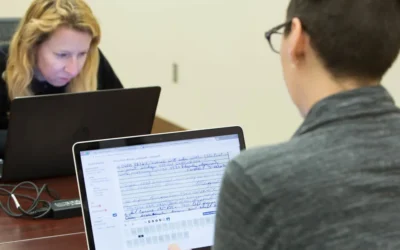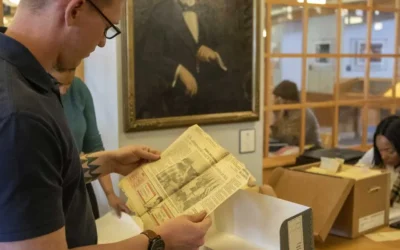Gathering Stakeholders for Your CMS Project
Margot Note
Selecting an archival collections management system (CMS) depends on determining goals, objectives, and requirements. Often, organizations start to look for new systems before they have agreed upon and documented what they want to do and how they wish to do it. While their excitement is admirable, a more thoughtful, planned-out approach to a major project tends to be more successful.
Since no standard guidance on the format and content of CMS requirements exists, some organizations employ consultants to determine systems requirements, while many decide on needs internally. By asking questions of their colleagues, archivists can illuminate the goals, aims, and requirements for their new CMS.
Select Your Team
The process should unfold in manageable steps. Choose the members of the selection committee. They might include budget decision-makers, colleagues with crucial expertise, and those whose work will be affected by the new system. Each organization differs, so think about who would be most impacted by a new system. By involving the right people early, organizations will get a better idea of their needs, pinpoint pain points, and gain a holistic view of their entire workflow. Buy-in for a solution happens when stakeholders feel they have input, can present feedback, and can voice their concerns. Let people take ownership of the process. Choosing a CMS to meet these needs will increase adoption and ensure that the repository achieves its desired results.
Who Can Say “Yes”?
Keep in mind that when a committee makes decisions, there may be a lack of clarity about who has the decision-making authority. Committees accommodate different perspectives throughout the organization, but they can be a barrier to effective decision-making. Does authority rest with the department with the budget or with the department whose requirements the CMS should satisfy? The answer should be clear early in the selection process.
IT involvement is critical to a successful CMS implementation. IT staff members have a unique view of the organization’s network and can understand the technical requirements of a CMS system. Their expertise helps select a solution that will integrate with existing and future infrastructure, applications, and workflows.
A Team Effort
Ensure that the organization employs enough experienced in-house staff for the project. If not, consider hiring consulting experts to advocate for institutional needs, help the team stay organized, and fill functionality gaps. Involving members of the staff across the organization underscores the importance of the initiative, solidifying institutional commitment to the new system. Hiring a staff member to complete the project or assigning it to a department is ineffective. For a project rooted in change management (the systematic approach to dealing with organizational transitions) such as the implementation of a CMS, the culture shift cannot rest with a sole champion. Institution-wide embrace of the solution ensures success and sustainability.
The All-Important Project Sponsor
Once the team assembles, designate the project manager: the person responsible for keeping the project on track. Also, find a project sponsor—an individual within the organization who provides project resources and support that enables success; the sponsor is also the decision-maker for project progress and phases. He or she should wield enough power to conquer roadblocks. When issues are beyond the project manager’s control, they are escalated to the sponsor, who has the authority to resolve them. A sponsor believes in and defends the business case—its rationale, goals, benefits, and outcomes. The project sponsor “owns” the project. In terms of project hierarchy, he or she is above the project manager.
Go, Team, Go
At a time when archival repositories distribute more primary research materials online, an archival collections management system can be used to expose hidden collections to scholars; this empowers archivists to fulfill professional commitments to public service, teaching, and outreach. To get to that point, though, a strong project team affords you the buy-in to achieve successful CMS implementation.
Margot Note
Margot Note, archivist, consultant, and author is a guest blogger for Lucidea, provider of ArchivEra, archival collections management software for today’s challenges and tomorrow’s opportunities. Read more of Margot’s posts here, and sign up here to register for her upcoming webinar, Illuminating Collections Management Systems Requirements.
Similar Posts
Collaborative Archival Relationships
Collaborative projects are instrumental in showcasing how archival collections can benefit various organizational departments.
Informational, Evidential, and Intrinsic Values within Archives
Archives provide authentic, reliable information and hold values that reflect their functions and uses; informational, evidential, and intrinsic.
A Sustainable Archives
Archivists prioritize sustainable practices and policies, rooting their work in ethics of care, often preferring digital processing and preservation
Archival Branding and PR Strategies
Archivists who adopt branding and PR strategies both safeguard historical treasures and contribute to their organizations’ evolution.




Leave a Comment
Comments are reviewed and must adhere to our comments policy.
0 Comments